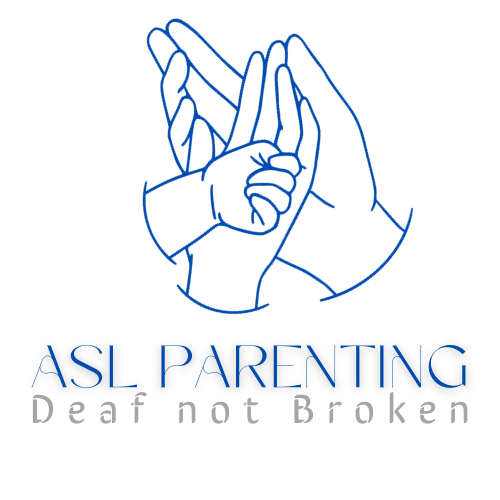Welcome to “ASL Parenting,” where we help parents tackle the challenges and celebrate the joys of raising deaf children. Today we’ll be on the search for reliable information and resources that you can use in your home.
The Quest for Knowledge
Parenthood is so full of questions you have to figure out the right answers to and wonder if you handled them correctly. For parents of deaf children, these questions often revolve around how to best support and integrate your child into the family. Your search for reliable information and resources is vital.
The Unique Needs of Deaf Children
Deaf children have unique communication needs that will affect their education. You and your partner must seek out accurate, up-to-date information that can guide you through the complex terrain of parenting a deaf child. Some of the challenges you will be faced with are:
How do I find a good Audiologist?
Will the school provide speech therapy? Can I even send them to my neighborhood school?
What are the chances that hearing aids will even help?
How do we know if a cochlear implant will be successful?
Should we encourage or discourage sign language?
Do I need to learn sign language? How do I even do that as a busy adult?
In the grand scheme of things, there are just a few general questions that come up early on… there will be SO MANY MORE! So how will you know if you get the right answers to these questions when there are so many opinions? Research all of the answers and make the right choice for your child after weighing all of the options and probabilities of success. Only you can know what feels right for your deaf child. If you regret a decision and another option feels like a better fit for your child down the road, pivot. The most important thing you can do is let your child know that you are there for them, no matter what special needs and considerations are required.
The Power of Family Integration
One key aspect of reliable information and resources is understanding the importance of family integration. You and your partner, your other kids and your extended family will have a powerful effect on your deaf child. Making that impact will require talking to and listening to them, especially in their first 3-5 years, when they’re building attachments and developing language skills. Regardless of the degree of their hearing loss, signs and gestures will be the best tool in your arsenal. At this point there is even research showing the benefits of sign language helping hearing children develop their language skills early, so don’t be afraid to sign with your deaf child.
Just as your hearing children learn English naturally from you, your deaf child can passively learn American Sign Language (ASL) when it’s incorporated into your family’s daily life. If you are being counseled not to sign with your deaf child you might need to start doing some independent research.
The Challenge of Finding Reliable Information
When you start looking into your options, the internet can be a double-edged sword. While it provides a wealth of information, it also offers misinformation. Finding reliable resources and experts is essential for making informed decisions about your child’s education, communication, and future. The medical community tends to view deafness as a medical handicap that needs to be cured, they research and treat it like they would a semi-hereditary disease. There is a lot of resentment from Deaf adults for the treatments their hearing parents were pressured into imposing on them in their youth. Please make sure that you look into the resources provided by the deaf community as well as the experiences of people who have experienced what your child is going through.
The Deaf Community as a Resource
The Deaf community is an invaluable resource for parents. Reach out, connect, and learn from those who have lived experiences. They can provide insights, recommendations, and a sense of belonging for your family. There are long-standing national organizations for the Deaf, by the Deaf that will have information, help and events that provide support and inclusion for deaf children and families. Some of these include:
The NAD
The American Society for Deaf Children
There are many more, and local support groups as well. Every local school for the deaf, interpreting program, state organization and The Center for Disease Control will have even more locally available advice and activities.
The Role of Support Organizations
Deaf advocacy organizations, educational institutions, and local support groups can be pillars of strength for parents seeking reliable information and resources. These organizations often offer guidance, workshops, and connections with experienced individuals. Much like the opinions and advice of the medical community, their opinions will be skewed by their experiences, training and the severity of the deafness that they usually work with. I certainly have my own biases, but I have no skin in the game, and neither I nor any of these advocacy groups an be allowed to dictate the way your child is raised, trained and treated. Your responsibility to your child is vital, so research, make your best educated decisions and see how it goes. What’s right for one deaf child won’t necessarily work for another, you will need to customize your child’s education plan and communication style to math his or her needs and the resources available, then tweak it as you see what works well and what doesn’t.
Real-Life Success Stories
To illustrate the power of finding reliable information and resources, we’ve invited [Guest Name], a parent who has navigated this journey and achieved remarkable success in supporting their deaf child through family integration.
The Benefits of Inclusivity
Family integration benefits not only your deaf child but your entire family. The inclusivity of ASL fosters stronger bonds, clearer communication, and a richer understanding of Deaf culture.
Navigating Educational Choices
When it comes to education, there are various choices to consider for your deaf child. Each path has its own set of considerations, and finding reliable information is crucial for making informed decisions. Most deaf children are funneled into their local schools, what is referred to as mainstreaming. This is a popular option because your children can all attend the same schools, they can form relationships with their neighborhood friends, they can attend services like speech therapy and they can learn to work with ASL Interpreters, which may be a fixture of the rest of their lives. Though popular, this isn’t the only option:
- Oral-only programs, where signing isn’t allowed. Strong connections with family and the hearing community, education is limited, because of the amount of time spent trying to master lip-reading and vocalization.
- Residential schools for the Deaf, where ASL is the primary language and the staff is Deaf or at least fluent in ASL. Students stay on campus during the week and go home on weekends. Strong ties with the Deaf community, weaker ties to the family unit.
- Day Schools for the Deaf, where students are bussed in and back home each day but are taught by Deaf or ASL fluent staff. Strong cultural ties and language development in ASL, allows for continued involvement in the family unit and neighborhood community.
The Impact on Your Child’s Future
Your search for reliable information and resources is an investment in your child’s future. It sets the stage for their education, career, and overall quality of life. The knowledge you acquire today will shape your tomorrow. Choosing the educational style and language emphasis might come down to what makes your life easier or what will make your child’s life easier and sometimes easier doesn’t even mean better. If I sound non-committal, I am; I don’t know your situation or your child’s particular degree of hearing loss or special needs. Undoubtedly some of you will choose to try audio devices and oral programs for at least part of your child’s education and they may or may not thrive in that situation, but you decide that only you can make with your child’s best interest in mind. No one else can make it because no one else will love them or make sacrifices for them like you will.
Conclusion
As we wrap up this topic, we hope you feel empowered to continue your search for reliable information and resources, ensuring the best possible future for your deaf child. Remember, you’re not alone on this journey.
Thank you for joining us today. We’ll be back with more informative and inspiring discussions about the multifaceted world of parenting and the power of family integration.



